Insoluble fiber is a type of dietary carbohydrate that doesn’t dissolve in water, playing a crucial role in digestive health by promoting regular bowel movements and preventing constipation․ Found abundantly in whole grains, fruits, vegetables, and nuts, it supports gut health and overall well-being․
Definition and Overview
Insoluble fiber, also known as “roughage,” is a type of dietary carbohydrate that doesn’t dissolve in water․ It remains largely undigested as it passes through the digestive system, providing bulk to stool and promoting regular bowel movements․ Unlike soluble fiber, insoluble fiber doesn’t form a gel-like substance but instead acts as a natural laxative, helping to prevent constipation and maintain gut health․ Found in whole grains, fruits, vegetables, nuts, and seeds, it is a vital component of a balanced diet, supporting overall digestive well-being․
Benefits of Insoluble Fiber for Digestive Health
Insoluble fiber promotes digestive well-being by preventing constipation, supporting gut health, and adding bulk to stool, which aids in regular bowel movements and a healthy digestive system․
Role in Preventing Constipation
Insoluble fiber plays a vital role in preventing constipation by adding bulk to stool, which helps speed up its passage through the digestive system․ This reduces the risk of stool hardening and promotes regular bowel movements․ By not dissolving in water, it retains water in the intestines, softening stool and making it easier to pass․ A diet rich in insoluble fiber-rich foods, such as whole grains and vegetables, helps maintain digestive regularity and prevents constipation naturally․ This makes it an essential component of a healthy digestive system․
Support for Gut Health
Insoluble fiber provides significant support for gut health by promoting a balanced gut microbiome․ It acts as a prebiotic, feeding beneficial bacteria in the colon, which aids in producing short-chain fatty acids․ These acids strengthen the gut lining, improving overall digestive function․ A diet rich in insoluble fiber foods, such as whole grains, vegetables, and legumes, helps maintain a healthy gut environment, reducing inflammation and enhancing nutrient absorption․ This support is crucial for a robust immune system and long-term digestive well-being․
Whole Grain Sources of Insoluble Fiber
Whole grains are rich in insoluble fiber, essential for digestive health․ Popular sources include wheat bran, quinoa, brown rice, and whole wheat bread, promoting regularity and gut balance․
Wheat Bran and Brown Rice
Wheat bran and brown rice are excellent sources of insoluble fiber, offering numerous health benefits․ One cup of wheat bran provides approximately 11 grams of fiber, while brown rice offers around 3․5 grams per cup․ Both foods help promote digestive regularity and prevent constipation by adding bulk to stool․ They are also rich in nutrients like vitamins and minerals, supporting overall gut health․ Incorporating these whole grains into your diet can significantly enhance your digestive well-being and contribute to a balanced diet․
Quinoa and Other Grains
Quinoa and other whole grains are rich in insoluble fiber, making them excellent additions to a healthy diet․ Quinoa provides about 5 grams of fiber per cup, while grains like amaranth and barley offer similar benefits․ These grains not only aid in digestion but also contribute to satiety and blood sugar control․ Incorporating quinoa and other whole grains into meals supports gut health and overall well-being, making them a nutritious choice for those seeking to boost their fiber intake naturally․
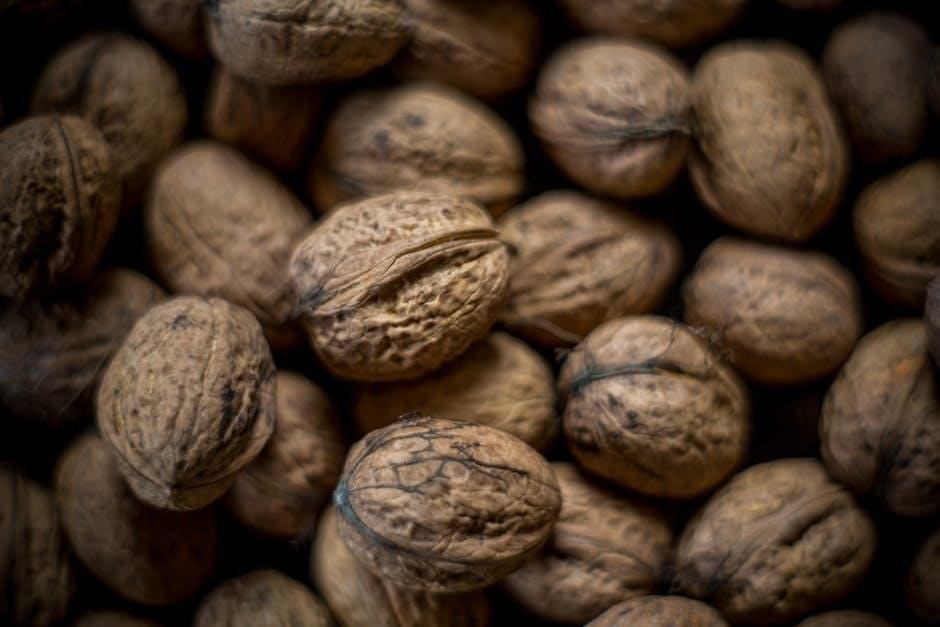
Fruit Sources of Insoluble Fiber
Apples, berries, and bananas are excellent fruit sources of insoluble fiber, promoting digestive health and regular bowel movements․ Incorporate these into your diet for natural, fiber-rich nutrition․
Apples, Berries, and Bananas
Apples, berries, and bananas are among the top fruit sources of insoluble fiber․ Apples provide about 1․5 grams of insoluble fiber per medium fruit, while berries like blackberries and blueberries offer significant amounts․ Bananas contribute around 0․7 grams of insoluble fiber per medium fruit․ These fruits not only support digestive health but also add natural sweetness and texture to meals․ Incorporating them into snacks, smoothies, or desserts can help boost your daily fiber intake and promote a healthy digestive system․
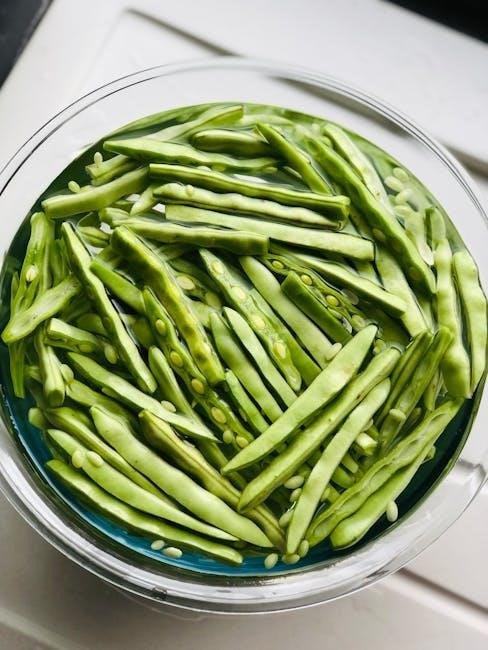
Vegetable Sources of Insoluble Fiber
Leafy greens, broccoli, carrots, and Brussels sprouts are rich in insoluble fiber, supporting gut health and preventing constipation․ These vegetables add bulk to stools, aiding smooth digestion․
Leafy Greens, Broccoli, and Carrots
Leafy greens, such as spinach and kale, are packed with insoluble fiber, aiding digestion and preventing constipation․ Broccoli is another excellent source, providing 3 grams per cup․ Carrots also contribute significantly, with 2 grams per half-cup․ These vegetables are rich in nutrients and fiber, promoting gut health by adding bulk to stools and supporting smooth digestion․ Incorporating them into meals enhances overall dietary fiber intake, ensuring regular bowel movements and a healthy digestive system․ They are versatile and can be enjoyed raw, cooked, or in salads, making them a great addition to any meal plan․

Legumes High in Insoluble Fiber
Legumes, such as beans, lentils, and chickpeas, are rich in insoluble fiber, providing up to 12 grams per cup․ They support digestive health by preventing constipation and promoting regularity․
Beans, Lentils, and Chickpeas
Beans, lentils, and chickpeas are excellent sources of insoluble fiber, with kidney beans providing up to 12 grams per cup․ Lentils offer 6․5 grams, while chickpeas contain about 6 grams․ These legumes support gut health by adding bulk to stools, aiding in regular bowel movements․ Incorporating them into meals promotes a balanced diet and helps prevent digestive disorders like constipation․ Their high fiber content also contributes to overall digestive well-being․

Nuts and Seeds Rich in Insoluble Fiber
Nuts and seeds are rich in insoluble fiber, with almonds providing 8 grams per 100g․ Chia seeds, sunflower seeds, and pumpkin seeds also contribute significantly to your daily fiber intake, enhancing digestive health and promoting regular bowel movements․
Almonds, Chia Seeds, and Others
Almonds, chia seeds, and other nuts and seeds are excellent sources of insoluble fiber․ Almonds provide approximately 12․5g of insoluble fiber per 100g, while chia seeds offer around 34․2g․ Sunflower seeds and pumpkin seeds also contribute significantly, with 8․6g and 5․5g per 100g, respectively․ These foods help promote digestive health, supporting regular bowel movements and preventing constipation․ Chia seeds, in particular, form a gel-like texture when mixed with water, aiding in softening stool and improving bowel regularity․ Incorporating these into your diet supports a balanced and healthy lifestyle․
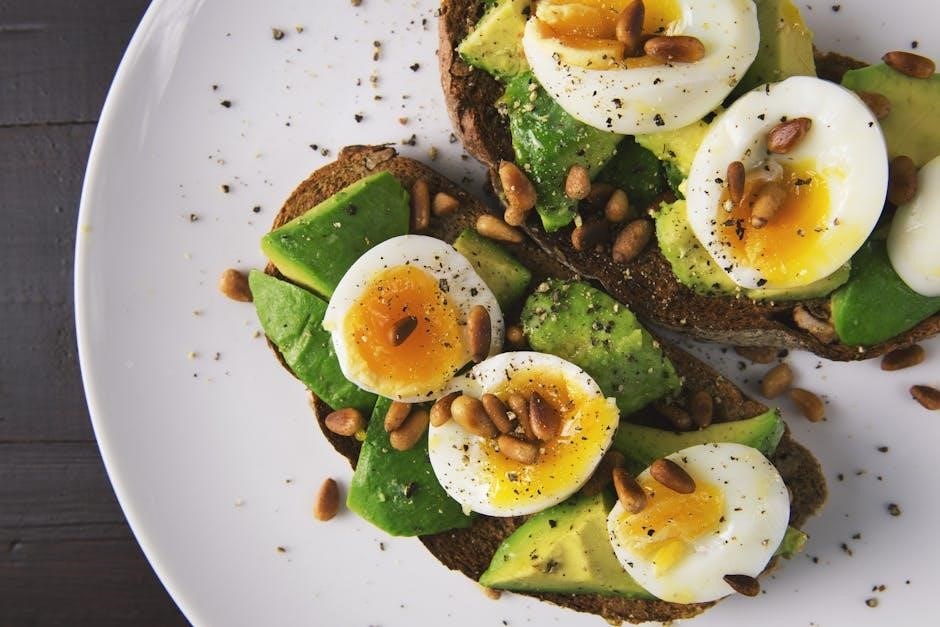
Comparison with Soluble Fiber
Soluble fiber dissolves in water, forming a gel-like substance, while insoluble fiber does not․ Soluble fiber helps lower cholesterol and control blood sugar, whereas insoluble fiber promotes bowel regularity and prevents constipation․
Differences and Combined Benefits
Soluble and insoluble fibers differ in their functions but together provide comprehensive health benefits․ Soluble fiber lowers cholesterol and stabilizes blood sugar, while insoluble fiber adds bulk to stools, preventing constipation and promoting regularity․ Combining both types supports digestive health, enhances nutrient absorption, and maintains a balanced gut microbiome․ A diet rich in both ensures optimal bowel function and overall well-being, making them essential components of a healthy diet․ Including a variety of fiber-rich foods ensures you reap the rewards of both fiber types․

Practical Tips for Increasing Insoluble Fiber Intake
- Start your day with whole-grain cereals or oatmeal․
- Incorporate vegetables like broccoli and carrots into meals․
- Add nuts, seeds, or dried fruits as snacks․
- Replace refined grains with whole-grain options in recipes․
- Gradually increase fiber intake to avoid digestive discomfort․
Meal Planning and Snacking Ideas
Plan meals around whole grains like wheat bran, quinoa, and brown rice․ Incorporate vegetables such as broccoli, carrots, and leafy greens into salads and stir-fries․ Snack on almonds, chia seeds, or dried fruits for a quick fiber boost․ Pair whole-grain crackers with hummus or avocado for added nutrition․ Start your day with oatmeal topped with berries or sliced apples․ Include legumes like lentils or chickpeas in soups and stews․ Download a PDF list of insoluble fiber-rich foods for easy meal inspiration and snacking ideas to support your digestive health and overall well-being․
Potential Side Effects of High Insoluble Fiber Diet
A high intake of insoluble fiber may cause bloating, gas, or abdominal discomfort in some individuals․ Gradual increases and adequate hydration can help minimize these effects․
Considerations and Moderation
While insoluble fiber offers numerous benefits, moderation is key․ A sudden increase in intake may lead to bloating, gas, or discomfort․ Gradual incorporation and adequate hydration are essential․ It’s important to balance insoluble fiber with other fiber types to avoid digestive issues․ Overconsumption, especially in sensitive individuals, can worsen conditions like irritable bowel syndrome․ Always consult a healthcare provider for personalized advice, ensuring a diet tailored to individual needs and health status․
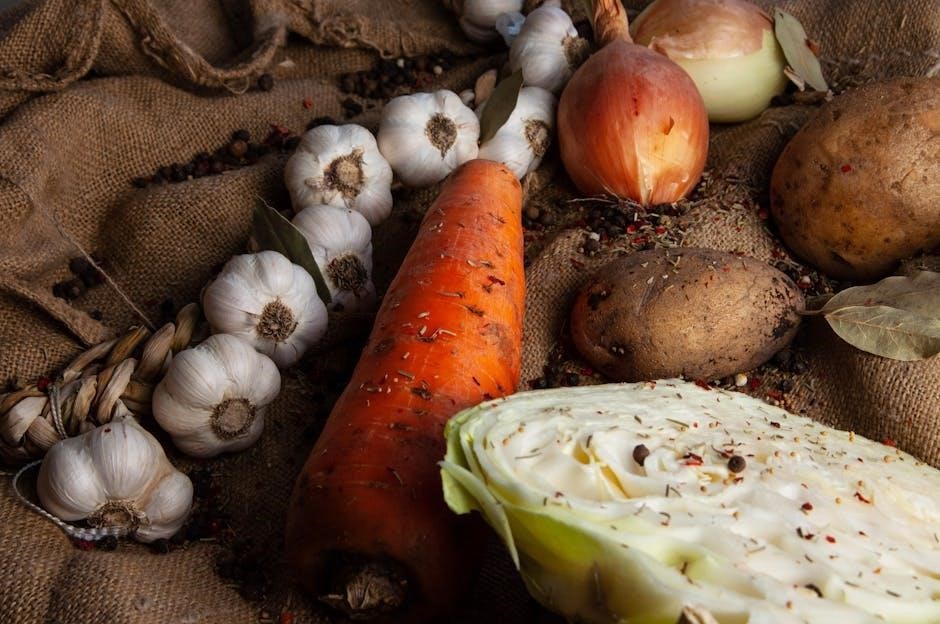
Insoluble Fiber and Weight Management
Insoluble fiber plays a significant role in weight management by promoting satiety and reducing overall calorie intake․ It adds bulk to meals, helping you feel fuller for longer․ Foods rich in insoluble fiber, such as whole grains, vegetables, and nuts, tend to have lower energy density, making them ideal for weight control․ Additionally, insoluble fiber supports healthy gut function, which is linked to improved metabolism and fat distribution․ Incorporating these foods into your diet, along with soluble fiber and proper hydration, can support a balanced approach to weight management․
Incorporating insoluble fiber into your diet is essential for maintaining digestive health and overall well-being․ By choosing whole grains, fruits, vegetables, and nuts, you can harness its benefits, including preventing constipation, supporting gut health, and aiding in weight management․ For a comprehensive guide, download a PDF list of high insoluble fiber foods to easily plan your meals and snacks․ A balanced intake of insoluble fiber ensures a healthier digestive system and contributes to long-term wellness․
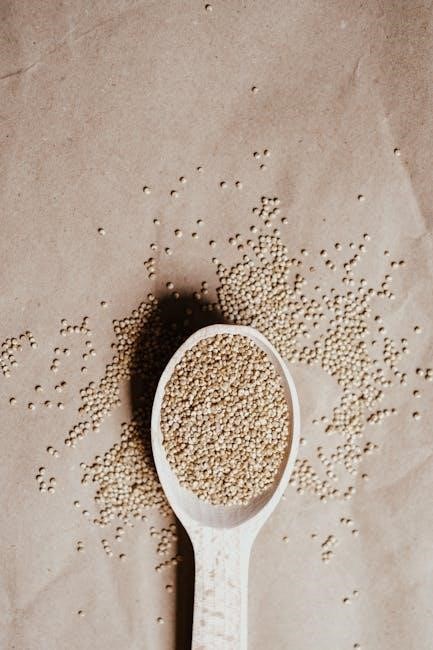
Downloadable PDF List of Insoluble Fiber Foods
Access a free downloadable PDF listing high insoluble fiber foods, including fruits, vegetables, grains, legumes, nuts, and seeds․ This comprehensive guide provides serving sizes and fiber content per serving, helping you easily identify and incorporate insoluble fiber-rich foods into your diet․ Perfect for meal planning, the PDF is printable and user-friendly, ensuring you never miss out on essential nutrients․ Download now to enhance your digestive health with a variety of delicious and nutritious options like wheat bran, almonds, and chia seeds․
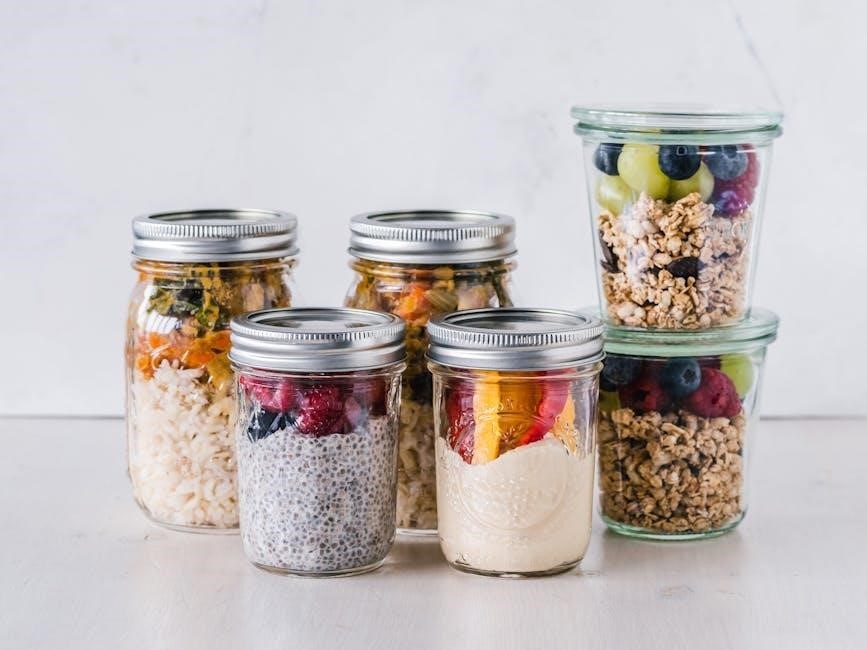
References and Further Reading
For more detailed information, refer to the Nutritional Therapy Association and Braden Diabetes Center resources․ Visit Alberta Health Services for comprehensive guides on fiber-rich diets․ Explore PubMed and Google Scholar for peer-reviewed articles on insoluble fiber benefits․ Check out listofthis;com for downloadable PDFs listing high insoluble fiber foods․ These sources provide evidence-based insights and practical tips for incorporating insoluble fiber into your meals, ensuring a well-rounded understanding of its role in digestive health․